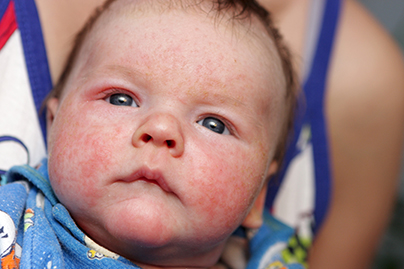Eczema, also known as atopic dermatitis, is a chronic skin disorder that involves itchy skin which becomes red, dry, scaly, and thick. Eczema is more common in children but can also occur at any age.

Eczema (atopic dermatitis) is quite common in children in the U.S. as well as other Westernized countries. In the U.S. alone, an estimated 20% of children have eczema (atopic dermatitis).1 Eczema can range from mild to severe and, depending on how much damage from scratching occurs, can lead to skin infections.
The cause of eczema is not exactly known but likely reflects an interplay between genetics and environmental factors. Many with eczema have family members with eczema or other allergic diseases, such as hay fever (allergic rhinitis) or asthma. Other risk factors have been investigated and found to possibly have some connection, such as:
Triggers of eczema are different from person to person, but may include:
ONLINE: All members of DrFuhrman.com can search the Ask the Doctor archives for discussions on this topic. Platinum and Diamond members can connect with Dr. Fuhrman by posting questions in the forum. Not a member? Join now.
IN PERSON or ONLINE: Book a consultation with a specialist at Longevity Rx in San Diego, California, run by Joel Fuhrman, MD and Cara Fuhrman, ND. Using nutritional protocols, cutting-edge screening tools, advanced imaging, and innovative treatments for pain and injuries, they'll create a personalized action plan to help you prevent and recover from illness, and achieve your optimal weight. Book online at Longevity Rx or call +1 (858) 367-3558
EVENTS: Join Dr. Fuhrman for an online boot camp, detox or other event. During these immersive online events, you’ll attend zoom lectures, follow a special meal plan, and have access to a special, live Q&A session with Dr. Fuhrman. Learn more about events.
The following are sample questions from the Ask the Doctor Community Platinum and higher members can post their health questions directly to Dr. Fuhrman. (All members can browse questions and answers.)
My baby has had nummular eczema since three months old. It started as a few tiny spots, but now it is spreading rapidly. The doctor recommended Aquaphor after a bath and a 1% steroid cream twice a day to the affected areas. It helps but it keeps coming back and is still spreading. What can we do?
He is 100% breastfed, and we started him on solids a week ago- all homemade and organic.
I understand eczema to be an inflammatory process, why would he be having this? What can we do?
Eczema can begin from an allergy or sensitivity to something ingested or to something in the environment, including irritants on the skin such as detergents, etc. Look carefully for any patterns so that you can identify what it might be. Sometimes foods from the mother’s diet cause eczema in the baby, so maybe experiment to identify if anything you may be eating is matching up with worse days. Remember that there is sometimes a delay of 2 days from when the mother eats something to when the baby will react fully, so keep a journal. Eggs, dairy, soy, and wheat are common offenders. Apply an oil-based moisturizer frequently during the day. It may be helpful for us to look at everything you are eating with a diet diary, and we can comment more in the Ask the Doctor forum.
I just went to the dermatologist, and he said I have dyshidrotic eczema on my hands. I have been eating a Nutritarian diet for many years now. What can I do to heal this?
You can try opening two capsules of borage oil and applying the oil to your hands daily or before bed for several weeks. Also, consider probiotics. One of my patients had 90% resolution of severe dyshidrotic eczema on his feet after three weeks of high dose probiotics. Increase the amount of DHA/EPA, and take borage oil or black currant seed oil too. Keep your hands out of water. Wear thick, waterproof cleaning gloves when you have to wash produce or dishes, and use an oil-based moisturizer every two hours while awake until this improves.
My 3-year-old son has had a patch of eczema on his face for months. I believe it started shortly after our summer vacation where he ate too much wheat. It clears for a week or two when I use a steroid cream alternating with a natural cream, but he scratches and it comes back. His diet is excellent. I don’t know what else I can tweak. He takes DHA/EPA Purity, Pixie Vites, a probiotic, and Vitamin D. He has been on this regimen the whole time he has suffered with this.
What can I do to help him? His poor face gets so red and oozy when he scratches.
It is possible he is reacting to one of the foods you are feeding him, so you may want to have him tested for allergies or do you own elimination experiment to see if it resolves after stopping a certain food. The most likely culprits (if it is at all related to what he is eating) are any of the nuts, corn, wheat, and soy to name a few, so test them individually.
You could also test him on a small amount of GLA, which is in oils like Borage seed oil, and you could also try increasing the DHA/EPA to the adult dose (0.75ml daily).
Unfortunately with eczema, if it gets scratched, then the cycle can continue even if any offending sensitivities have recently been eliminated, so try to restrict his scratching as much as you possibly can. Cover his hands with socks at night so he can’t scratch. Use an oil-based moisturizer at least 4 times a day.